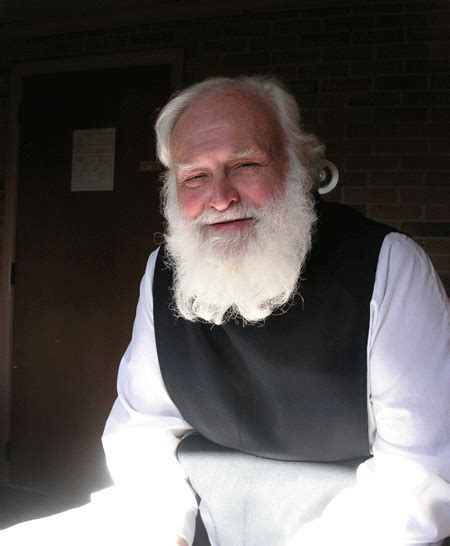A Quote by Basil Pennington
False self is an identity based on what you have, what you do, and what others think about you. In stark contrast to this is the true self in Christ, which is who we are before God and in God - Christ living in us, as Paul put it to the churches in Galatia
Related Quotes
We are not preaching the Gospel of a dead Christ, but of a living Christ who sits exalted at the Father's right hand, and is living to save all who put their trust in Him. That is why those of us who really know the Gospel never have any crucifixes around our churches or in our homes. The crucifix represents a dead Christ hanging languid on a cross of shame. But we are not pointing men to a dead Christ; we are preaching a living Christ. He lives exalted at God's right hand, and He "saves to the uttermost all who come to God by Him."
A Christian is one who recognizes Jesus as the Christ, the Son of the living God, as God manifested in the flesh, loving us and dying for our redemption; and who is so affected by a sense of the love of this incarnate God as to be constrained to make the will of Christ the rule of his obedience, and the glory of Christ the great end for which He lives.
Follow Christ in the denial of all the wills of self, and then all is put away that separates you from God; the heaven born new creature will come to life in you, which alone knows and enjoys the things of God, and has his daily food of gladness in that manifold blessed, and blessed, which Christ preached on the mount.
The gospel is saying that, what man cannot do in order to be accepted with God, this God Himself has done for us in the person of Jesus Christ. To be acceptable to God we must present to God a life of perfect and unceasing obedience to his will. The gospel declares that Jesus has done this for us. For God to be righteous he must deal with our sin. This also he has done for us in Jesus. The holy law of God was lived out perfectly for us by Christ, and its penalty was paid perfectly for us by Christ. The living and dying of Christ for us, and this alone is the basis of our acceptance with God
Christ prays in me, Christ works in me, Christ thinks in me, Christ looks through my eyes, Christ speaks through my words, Christ works with my hands, Christ walks with my feet, Christ loves with my heart. As St Paul's prayer was: I belong to Christ and nothing will separate me from the love of Christ. It was that oneness, oneness with God in the Holy Spirit.
The only chains God wants us to wear are the chains of righteousness--not the chains of hopeless subjectivism, not the shackles of risk-free living, not the fetters of horoscope decision making--just the chains befitting a bond servant of Christ Jesus. Die to self. Live for Christ. And then do what you want, and go where you want, for God's glory.
God’s love sets us free from the need to seek approval. Knowing that we are loved by God, accepted by God, approved by God, and that we are new creations in Christ empowers us to reject self-rejection and embrace a healthy self-love. Being secure in God’s love for us, our love for Him, and our love for ourselves, prepares us to fulfill the second greatest commandment: To love our neighbor as ourselves.
After all, what is your personal identity? It is what you really are, your real self. None of us is what he thinks he is, or what other people think he is, still less what his passport says he is. And it is fortunate for most of us that we are mistaken. We do not generally know what is good for us. That is because, in St. Bernard's language, our true personality has been concealed under the 'disguise' of a false self, the ego, whom we tend to worship in place of God.
The whole story of creation, incarnation, and our incorporation into the fellowship of Christ's body tells us that God desires us, as if we were God, as if we were that unconditional response to God's giving that God's self makes in the life of the Trinity. We are created so that we may be caught up in this, so that we may grow into the wholehearted love of God by learning that God loves us as God loves God.
Grace is the good pleasure of God that inclines him to bestow benefits upon the undeserving. It is a self-existent principle inherent in the divine nature and appears to us as a self-caused propensity to pity the wretched, spare the guilty, welcome the outcast, and bring into favor those who were before under just disapprobation. Its use to us sinful men is to save us and make us sit together in heavenly places to demonstrate to the ages the exceeding riches of God's kindness to us in Christ Jesus.
Christ became our Brother in order to help us. Through him our brother has become Christ for us in the power and authority of the commission Christ has given him. Our brother stands before us the sign of the truth and the grace of God. He has been given to us to help us. He hears the confession of our sins in Christ's stead and he forgives our sins in Christ's name. He keeps the secret of our confession as God keeps it. When I go to my brother to confess, I am going to God.
The person who is living by grace sees this vast contrast between his own sins against God and the offenses of others against him. He forgives others because he himself has been so graciously forgiven. He realizes that, by receiving God’s forgiveness through Christ, he has forfeited the right to be offended when others hurt him.






































